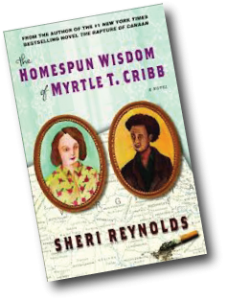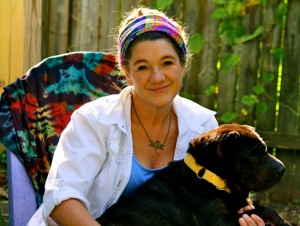Some years ago, I had the pleasure of interviewing Sheri Reynolds at the James River Writers Conference, in Richmond, Virginia. In preparation, I read a good handful of her novels. I was so impressed with the ease of her language, the charm and quirkiness of her characters, and the depth of her stories. She is a natural-born writer, not unschooled, but with a strong affinity to the Southern oral storytelling tradition. Wherever her magical novels come from, I always look forward to reading them! In honor of her return to the JRW Conference in October, I wanted to ask Sheri a few questions about her writing process. VP: You are the author of six novels, which is very impressive and wonderful. I’d love to learn about your process. You mentioned to me that the next novel is still in your head. I’m curious how you take it from there to the finished manuscript?
 SR: I’m the author of more than six! I’ve got six published, though, and I’ve submitted number seven. I’ve written a lot of novels that never made it into the world, and really, they shouldn’t. They’re books I needed to write to figure something out—practice books or experiments. So I’ve written probably a dozen novels—and published six so far, with number seven, The Cordial Grave, just turned in to my agent.
SR: I’m the author of more than six! I’ve got six published, though, and I’ve submitted number seven. I’ve written a lot of novels that never made it into the world, and really, they shouldn’t. They’re books I needed to write to figure something out—practice books or experiments. So I’ve written probably a dozen novels—and published six so far, with number seven, The Cordial Grave, just turned in to my agent.
VP: What role does revision play in your process? And how are your agent, or other readers, involved?
SR: I teach full time at Old Dominion University, so I write very little during the regular academic year. Most of my writing happens in the summers and, at this point in my life, it takes me two or three summers to draft a novel and another one or two to revise it. But I revise as I go, too. When I’m writing, I generally start the day reading what I wrote the day before and fiddling with it, filling it out, choreographing scenes I’d sketched in. Then I write forward. So I do some revision and some new writing each day.
At the end of every day, I read what I’ve written aloud to my partner, Barbara, and she responds–letting me know what kept her interest and what I should reconsider. She’s a psychotherapist, so she’s especially good at getting a beat on characters and whether they’d feel or say what I’ve described. So she hears the book piece by piece. Then I also have a few dear friends and readers who see the manuscript when I have it in a near-complete state. I only send it to my agent when I think it’s finished. (And then, of course, she tells me that it isn’t—and off I go again revising...)
 VP: At the upcoming James River Writers Conference, you’re teaching a workshop on how to control pacing in a piece of writing. I wonder if you can talk about how you think of that issue in your own work?
VP: At the upcoming James River Writers Conference, you’re teaching a workshop on how to control pacing in a piece of writing. I wonder if you can talk about how you think of that issue in your own work?
SR: I don’t think of it at all when I’m actually writing! But I study it in the works of other writers, and from them, I become aware of moves and strategies that I might try out one day. It’s like dancing, you know? When I’m writing, I’m not in an analytic mode. I’m imaginative, creative, wide open. (What a feeling, yeah? Wish I could stay there.) Later on, when the draft is finished, I go back and examine different scenes or chapters and try to be aware of whether there’s anything excessive or boring or redundant. I want to be sure the important scenes are fully developed and that I’ve stripped away anything that was there just to get me as a writer from one place to another.
VP: And how do you sustain the pacing of your career as a writer? What works to keep yourself producing novels at the pace that suits you, while also juggling work and relationships?
SR: Well, I don’t know that I do a very good job of it, but basically, I’m a professor during the academic year, a writer during the summers, and I try to put my relationships with my intimates above everything else, always. I don’t really see all the pieces of my life as separate. I’m comfortable now with the understanding that when I’m teaching (and not doing much writing), my characters and ideas are marinating. I also keep a little notebook in my car so that I can always play with my characters whenever I’m waiting for a train to pass, or stuck in traffic. And I look forward to being in the airport because I make airport time my secret writing time.
VP: What advice do you have for aspiring writers today?
SR: Educate yourself. Find the best practitioners of whatever kind of writing you’re doing and study their works to improve your own skills.